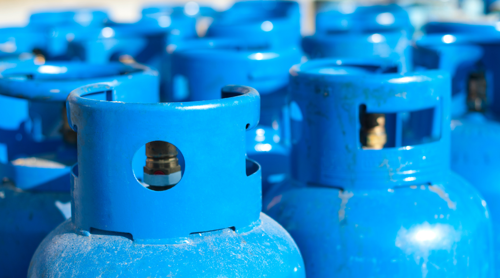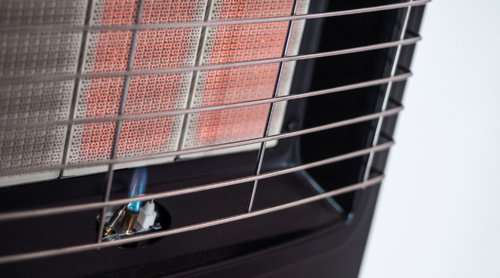Stay gas-safe this winter
Published: 15/12/2022
Ashford Borough Council is urging the borough’s 130,000 residents to take steps to stay gas-safe in the home this winter, with a special focus on the regular servicing of gas appliances and avoiding the use of potentially dangerous portable bottled gas heaters indoors.
And as the largest landlord in the borough, the council has issued a strongly worded reminder to council house tenants that portable gas heaters are prohibited indoors under the terms of their tenancy agreement.
Also there must be no storage of portable gas cylinders inside any council homes, and action will be taken to enforce the rules.
The council has around 5,100 residential properties on its books, meaning that around 10% of homes in the borough are council-owned. It ensures that all gas appliances it owns are safety checked by an expert every year but has warned of the dangers of poorly maintained appliances that tenants may bring into the property.
Their advice this winter, which is backed by the Kent Fire & Rescue Service, is not to take chances and to keep your family safe by following the following guidance.
“Don’t be the 1 in 4!” warns the experts
Seven million homes in the UK – that’s one in four households – have dangerous gas appliances, according to the latest figures from gas safety experts Gas Safe Register.
During the recent Gas Safety Week, the national body unveiled shocking statistics that lift the lid on bad habits that could threaten the safety of householders. It shows one in three people (31%) have used excuses to get out of having their gas appliances safety checked.
Gas Safe Register said nearly seven million homes in the UK have potentially dangerous gas appliances, including boilers, cookers and gas fires. If left unchecked, these faults can pose a threat to life from gas leaks, fires, carbon monoxide poisoning and explosions.
It says many homeowners have a ‘if it ain’t broke don’t fix it’ mentality as an excuse for skipping annual gas safety checks, even though this could be masking lethal faults.
Gas Safe Register is the official list of gas businesses registered to work legally on boilers, cookers and fires. By law, anyone working with gas must be listed on the Register. Visit Gas Safe Register online to find a registered business in the Ashford borough.
Real life stories…
Ashford Borough Council staff and contractors share their experiences of dangerous situations found in homes, involving gas appliances, electric heaters and more. These are real stories...
Paul says he has witnessed clothes being dried on an electric storage heater, furniture pushed up against storage heaters, and even dog beds pushed under storage heaters.
Heating surveyor Stephen said: “Portable gas heaters expel the entire products of combustion into the room which slowly depletes oxygen levels. If used for a period of time, the heater will use much of the oxygen in the room and as the combustion process needs oxygen to burn safely, the reduced oxygen causes incomplete combustion which leads to the production of CO directly into the room.
“If there are any people in the room, the build-up of CO can be serious. The time that it takes for the situation to become critical depends on the length of time the heater is used, ventilation (most people will tend to have their windows shut in the winter) and the size of the space.
“Gas cylinder rubber hoses are another issue. Hoses have an expiry date and have to be changed before they become worn and damaged, else they can become prone to leaking.
“LPG is heavier than air and will accumulate from the floor up, thus adding to the likelihood of asphyxiation or toxicity if you are low to the ground. In the home this could be particularly dangerous for small children playing on the floor or for pets.”

Stephen also warned about using portable gas heaters in outbuildings, garages and sheds where there is a greater chance of encountering flammable liquids and vapours that could be ignited. “Gas cylinders should be stored externally when not in use, but this is not normally the case with portable heaters as the bottle tends to remain in the heater until it needs changing,” he added.
Anthony said that in June 2021 council staff noticed a gas cylinder cooker and heater in one of our independent living scheme flats. The scheme houses some of our more vulnerable residents. The resident had no electricity or gas because he was in dispute with his energy provider and was making do with the gas cylinder cooker.
“The two items were in a poor condition and we were worried that they presented a fire safety risk, particularly as there was no light in the property at night. The resident refused to remove them.
“With his safety our main concern, we applied for an emergency injunction to force him to remove the items to an agreed location outside the flat. We had a telephone emergency court hearing on the same day and obtained the injunction. At 10pm that night we hand delivered the injunction to him and he reluctantly agreed to remove the items and for further checks to be done.
“While this may seem harsh on the resident, ultimately it helped him. We supported him to find a new home where he could start fresh with an energy provider. By acting swiftly the same day we found the dangerous equipment, we made sure he – and others living in the scheme – were safe. It also led to this vulnerable individual being offered a new home that had power, and ultimately stopped the use of dangerous bottled gas equipment.”
Top tips for home safety
- Learn the six main symptoms of carbon monoxide (CO) poisoning – headaches, nausea, dizziness, breathlessness, collapse and loss of consciousness and teach them to others.
- Check gas appliances for warning signs that they are not working properly – lazy yellow flames instead of crisp blue ones, black sooty marks or stains on or around the appliance and high levels of condensation in the room.
- Fit an audible carbon monoxide alarm to alert you if there is carbon monoxide present.
- Don’t block air vents. They provide a flow of air for the safe operation of boilers and fires.
- Have all your gas appliances safety checked every year by a Gas Safe registered expert.
- If you suspect carbon monoxide poisoning, get some fresh air and leave the house quickly. See a doctor and if you are very unwell call 999 for an ambulance. The National Gas Emergency Helpline is available 24/7 on 0800 111 999.
- When using electrical items at home, including fairy lights this Christmas, keep the number of plugs in an adaptor to a minimum. Overloaded sockets can cause a fire.
- If you use an additional heater in the chillier months, remember to keep it well away from clothes, curtains and other materials that could catch fire.
- Plan an escape route so that you can get out of your home in the event of a fire.
- Check you have working smoke alarms on each level of your home and test weekly.
- In an emergency call 999.
Council housing inspections
For gas appliances the council own we arrange for a Gas Safe engineer to service the fire and boiler and undertake a safety check each year. When we contact you to arrange an appointment, please help us ensure it takes place. The servicing only takes 30-45 minutes. Failure to allow access will lead to court action to gain access, with the costs charged to you. Tenants are responsible for safety checks on any gas appliances they own.
Tenancy agreements do not allow the use of portable gas heaters in council homes, due to concerns about the maintenance, safety and storage of combustible gas heaters.

Used efficiently, gas central heating is the best and safest way to keep your home warm. Using alternative forms of portable heating, like electrical operated storage or convector heaters instead of your central heating, can sometimes be more costly. See links below to find out more about grants available to keep your home warm.
If you are in a rented home and feel improvements are needed to insulate and draught-proof the property contact your landlord. You can also contact us by email at privatesectorhousing@ashford.gov.uk to address issues relating to cold homes.
Visit our private sector grants page to find out which grants are available to improve your property.
Getting help with your home energy bills
Warm Home Discount: £140 annually off electricity bills for those eligible.
Winter fuel allowance: payments for pensioners and vulnerable £100-£300 annually.
Cold weather payments is a scheme run by the government from 1 Nov to 31 March every year, those eligible could receive £25/wk.
KSAS – a KCC service for vulnerable or low income households who need help. Visit Kent County Council's website to learn more.
Green Doctors: A charity which offers free advice on saving money on your energy bills. The charity provides help in understanding how to use energy and heating systems and understanding bills and accessing help for energy debt.
Debt assistance: If you’re struggling with debt find advice and help through Citizen Advice.
Grants to help pay off your energy debts.
For advice on reducing your energy bills or making your home warmer visit Simple Energy.






